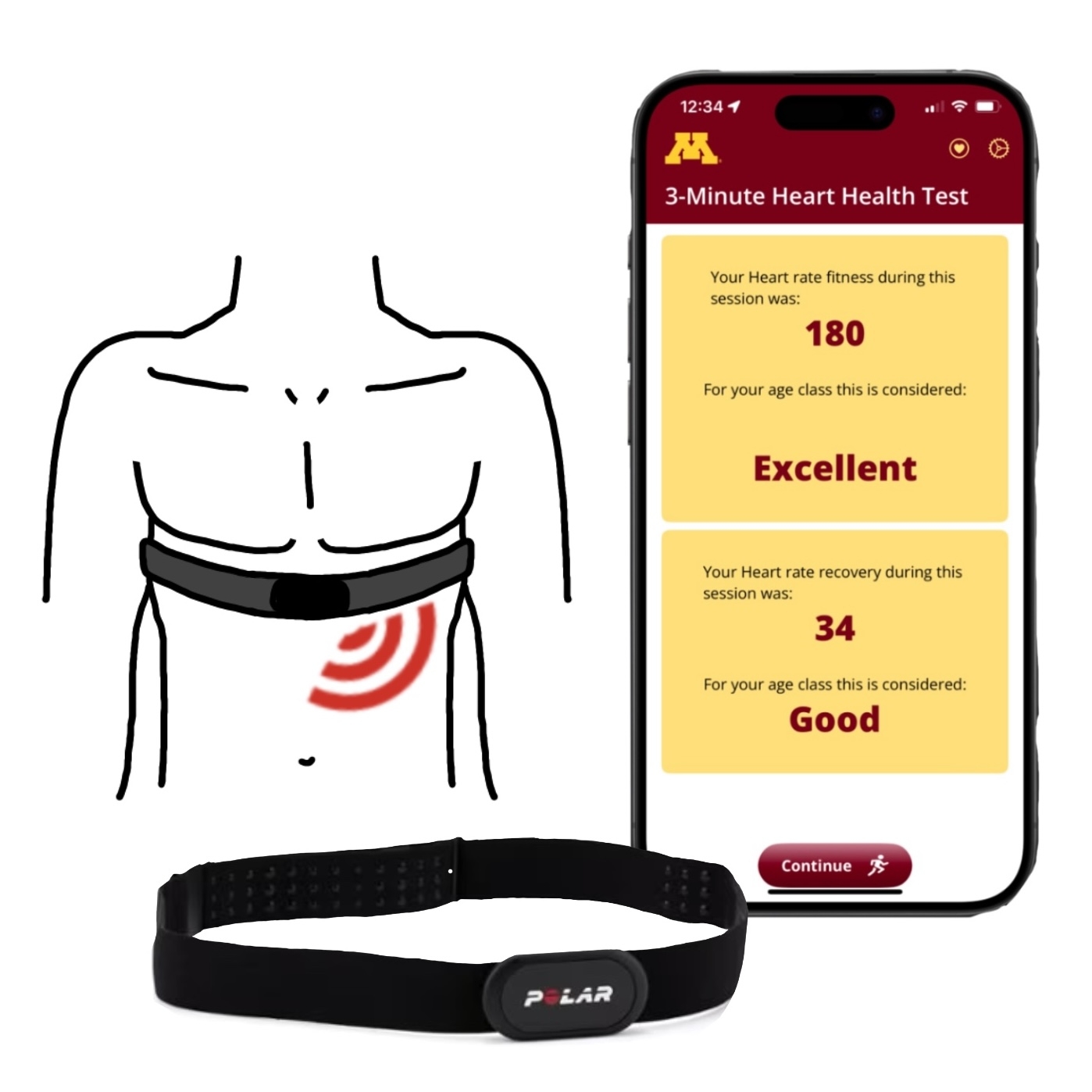Final ID: P3090
3-Minute Heart Health App: A Feasibility Study
Abstract Body: Background: Cardiovascular (CV) health can be estimated using CV risk factors or can be evaluated more precisely by investigating individual fitness and subclinical disease. Current options involve expensive procedures requiring specialist monitoring and interpretation or radiation exposure and have inequitable access. In contrast, the change in heart rate in one minute after maximum exercise, or heart rate recovery (HRR) is a significant predictor of mortality that does not require specialized equipment and can be done in many settings. In this feasibility study, we aim to assess max heart rate achieved by adults after two minutes of exercise and determine HRR using a Bluetooth heart rate monitor.
Methods: We developed the 3-Minute Heart Health App to facilitate this accessible approach to evaluating heart health. We partnered with a primary care clinic to enroll healthy, asymptomatic patients after their visit and listed the study on the University StudyFinder website. For this ongoing pilot study, the app is being paired with a chest band heart rate monitor. When exercise begins, the app provides a countdown timer and displays the patient’s percent of age-adjusted max heart rate (MHR) achieved. After 2 minutes of exercise, the app signals participants to stop and heart rate is monitored for 1 minute. The app then displays the age-adjusted Heart Fitness Grade and HRR (Figure 1).
Results: Pilot testing has allowed us to strategically design and optimize the user experience while exploring feasibility of this approach. Of eight patients approached in clinic, seven consented and enrolled. An additional four participants were recruited via StudyFinder. Age ranged from 23 to 73 years; 10/11 were able to achieve >70% of MHR and 7/11 reached >85% of MHR in 2 minutes. Average HRR was 39 bpm; all but 1 had HRR >25bpm. Participant feedback included desiring different exercises to increase heart rate and alternative heart rate monitor devices. There was overall enthusiasm about a routine evaluation of cardiovascular health that participants can monitor over time.
Conclusion: Our preliminary findings suggest that the 3-Minute Heart Health test is acceptable and can be implemented in an outpatient setting This study is ongoing and more data are being collected to further determine acceptability and to evaluate characteristics of participants who reach a target MHR with normal/abnormal HRR.
Methods: We developed the 3-Minute Heart Health App to facilitate this accessible approach to evaluating heart health. We partnered with a primary care clinic to enroll healthy, asymptomatic patients after their visit and listed the study on the University StudyFinder website. For this ongoing pilot study, the app is being paired with a chest band heart rate monitor. When exercise begins, the app provides a countdown timer and displays the patient’s percent of age-adjusted max heart rate (MHR) achieved. After 2 minutes of exercise, the app signals participants to stop and heart rate is monitored for 1 minute. The app then displays the age-adjusted Heart Fitness Grade and HRR (Figure 1).
Results: Pilot testing has allowed us to strategically design and optimize the user experience while exploring feasibility of this approach. Of eight patients approached in clinic, seven consented and enrolled. An additional four participants were recruited via StudyFinder. Age ranged from 23 to 73 years; 10/11 were able to achieve >70% of MHR and 7/11 reached >85% of MHR in 2 minutes. Average HRR was 39 bpm; all but 1 had HRR >25bpm. Participant feedback included desiring different exercises to increase heart rate and alternative heart rate monitor devices. There was overall enthusiasm about a routine evaluation of cardiovascular health that participants can monitor over time.
Conclusion: Our preliminary findings suggest that the 3-Minute Heart Health test is acceptable and can be implemented in an outpatient setting This study is ongoing and more data are being collected to further determine acceptability and to evaluate characteristics of participants who reach a target MHR with normal/abnormal HRR.
More abstracts on this topic:
An In-Depth Review of the Clinical Value and Accuracy of Wearable Technology in Blood Pressure Monitoring
Jawed Inshal, Khan Zaraq, Abdul Qadir Muhammad Umair, Jabeen Shafaq, Farwa Umme, Bin Gulzar Abu Huraira
A peptoid derivative of alpha-calcitonin gene related peptide improves cardiac function in pressure-overload heart failure miceKumar Ambrish, Deloach Sarah, Dipette Donald, Potts Jay

